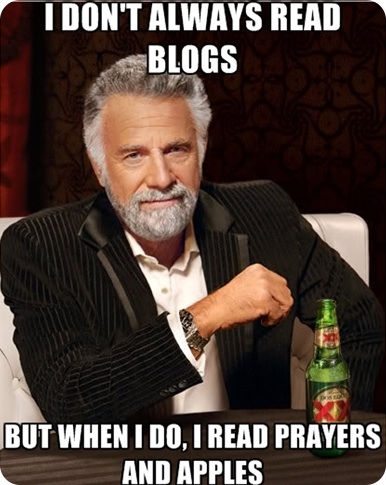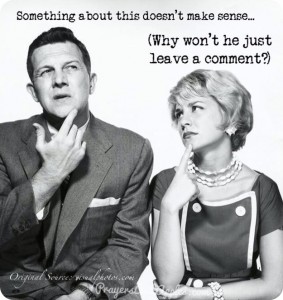 I’m not gonna lie: I wrote this post just so I could use that picture. A man who lives vicariously through himself? Who once had an awkward moment, just to see what it felt like?
I’m not gonna lie: I wrote this post just so I could use that picture. A man who lives vicariously through himself? Who once had an awkward moment, just to see what it felt like?
Who doesn’t want to read an article about that guy?!
Unfortunately, after watching and re-watching commercials on YouTube for half an hour (you can tell this has been a really productive evening for me), I finally had to be honest with myself: the guy from the Dos Equis commercial really doesn’t have too much anything to do with mind-body-spirit science.
…But, luckily, alcohol does!
Wait, I love those Dos Equis commericals as much as the next guy – but why are we talking about alcohol?
Prayers and Apples is all about the mind-body-spirit connection, and few substances have as immediate (and immense) of an effect on all three areas as alcohol. Drinking affects what you think, what you remember and how you feel about what you think and remember. It knocks you out, gives you energy and makes you sick from bouncing back and forth between the two (or maybe that’s from the room spinning?). Drinking impairs your judgement, puts you in conflict with your own beliefs and often challenges your morals.
And then other times, it’s just really, really fun.
But either way, it’s a mind-body-spirit experience.
I can’t remember the last time I had so much fun! …No seriously, I can’t remember.
Ever wonder why you meet someone at the bar and they seem really nice, but then you see them again and they seem really creepy? And all of your friends are even more creeped out than you?
The first part’s easy (you were drunk, it was dark, the music was loud, whatever). But what about the second part? Why do you find yourself dating him telling your friends he’s not that bad? He is that bad. He’s the creepy guy you met at the bar.
Or what about this: Ever wonder why you can’t really remember what you and your best friend talked about for two hours while you ate takeout food at 3am, but you can remember exactly how much money you saved when that jerk bartender said he was sorry for making you wait and offered you a free drink? If you think hard enough, you can probably remember the name of every single person standing around you.
Why is that? Why do we remember the things we do when we drink?
Working Memory: The Chalkboard
Let’s start with the basics. There’s a couple terms you’re going to need to understand and the first is working memory. Think of your working memory as a chalkboard. If someone rattled off ten different numbers and asked you to add them all up, that’s where you’d write the numbers down in your head. (Actually, if the numbers were completely random and had no significance, you’d probably only be able to remember about five… but that’s a post for another day!) If you want to get technical:
Working memory can be described as a set of cognitive processes that enable temporary storage, manipulation, and movement of information between short-term and long-term stores in the service of behavioral or self-regulatory goals (Baddeley 1986, 1992 as cited by Bartholow, Pearson, Gratton & Fabiani, 2003).
Person Perception: I know people like you…
Person perception involves forming impressions, stereotyping and categorizing. (It’s not too politically correct, but it’s a super important brain function that allows us to adapt, avoid danger and, most importantly: navigate the social scene.) Predicting others’ behavior – and detecting when behavior is inconsistent with predictions – is a basic and fundamental aspect of social perception (Jones, 1990; Olsen, Roese & Zanna, 1996).
Inconsistency Resolution: Dude! I never saw that coming!
A number of studies have indicated that encountering behavior that violates previously held expectations requires a lot of work on the part of the perceiver to fit the new information in with their existing beliefs (Bartholow, Fabiani, Gratton & Bettencourt, 2001; Hastie & Kumar, 1979; Srull, Lichtenstein & Rothbart, 1985; Stangor & Duan, 1991).
For example: You think your girlfriend loves you. You think your girlfriend is a nice girl. You think you love your girlfriend. You come home early and find your girlfriend making out with your best friend.
Hm.
That’s gonna take some serious inconsistency resolution (Srull & Wyer, 1989).
(And a drink. You’re definitely going to need a drink.)
Valence: I have a good feeling about this
Last definition, I promise. Valence is pretty much the positive or negative value you assign to something in your head. Like your girlfriend in the scenario above. She had positive valence.
(“Had” being the operative word in that sentence….)
Why do I need to know this? Get back to the alcohol!
So basically, when you expect someone to be nice (because they’re in the positive valence category)… and then they are, it doesn’t really hold a lot of weight in your brain. But when you expect your nice girlfriend not to make out with your best friend… and then she does, the whole inconsistency resolution thing kicks in and suddenly stuff begins registering as important. The more your brain works on something, the more you remember it. And, typically speaking, we spend more time trying to figure out why good people do bad things (bye, bye girlfriend) than we do thinking about bad people doing good things. (By the way, this is the sober version of us I’m talking about.)
The puzzle comes together – but where’s Leonardo DiCaprio?
A number of studies have supported the idea that executive functions carried out in your working memory are required to reach an inconsistency resolution (Dijksterhuis & van Knippenberg, 1995; Macrae, Bodenhausen, Schloersheidt & Milne, 1999; Macrae, Hewstone & Griffiths, 1993). In other words, when bad people do good things or good people do bad things, your brain polishes everything up in your working memory – taking into consideration valence (how positively or negatively you feel about certain things), with the goal of reaching an inconsistency resolution (getting to a place where it all makes sense and doesn’t seem so strange).
And now here’s where you can cue Jamie Foxx and blame it on the a-a-a-a-a-alcohol, because studies have suggested that alcohol may impair executive working memory (Finn, Justus, Mazas & Steinmetz, 1999) – or, more specifically: change the conditions under which it works (Bartholow et. al., 2003).
How you ask?
(Side note: Does anyone else feel like we’re in Inception right now, traveling like a hundred levels down into some sort of research-study-labyrinth? Or is that just me?)
As we already know, if someone violates our expectations (and especially if a good person does something bad), our working memory kicks in to resolve the inconsistency and a lot of mental resources are put to use – meaning the whole ordeal is going to make a big impact in our mind (and we’ll remember it easier than someone who looked nice saying something nice to us when we passed them on the street).
Well, according to Bartholow et. al. (2003), alcohol in a moderate amount (that moderate amount part is important) influences working memory via our cerebral reward system – which, to keep things simple, starts handing out more rewards when it’s tipsy (Fromme & D’Amico, 1999). This change in the cerebral reward system, researchers argue, causes intoxicated people to assign different valence to things than they normally would. It’s not that they eliminate the negative stuff, they just give a lot more emphasis to the positive. And that, in turn, warps the whole inconsistency resolution process.
Tell it to me straight. Use an analogy or something.
Here’s how it works: Drunk Sally still forms the same first impressions and separates things into the right categories (i.e., “Creepy Guy” vs. “Cute Guy”). She just gets all soft and mushy about updating them. (Remember, your working memory is like a chalkboard, so if you get a new note about someone you should scribble it down so you can adjust their file.) For instance, when Creepy Guy ‘accidentally’ bumps into her, Drunk Sally doesn’t take away any points. In fact, she gives him 10 bonus points just for saying he’s sorry! And what about when Cute Guy says something creepy? She just giggles and lets him keep all his points. He’s cute, who cares!
Starting to see how this inconsistency resolution thing gets twisted? Keep in mind: you’re going to remember the stuff that your brain has to work on the most. So look at the situation I just described. Drunk Sally didn’t have to add or subtract any points from Cute Guy. So she’s not going to remember much about him. But she did have to add 10 points to Creepy Guy. So that’s who she’s going to remember. And guess what. When she remembers him, she’s going to have good feelings about him because all of the ‘work’ she did on him was positive. That’s why when she sees him the next day, her friends are going to be a lot more creeped out than she is.
Same thing with the best friends/bartender example. Your friend’s a good friend. He got you takeout food at 3am. That’s what good friends do. No bonus points for that. No need to do any work. But that bartender? He was a jerk. So when he said he was sorry and he gave you a free drink? Man, that’s like 25 bonus points. You’ll remember that guy all week!
However, if Drunk Sally had been sober, she would have added and subtracted points from both guys. She would’ve ended up remembering Cute Guy more, because it would’ve taken her brain more energy to reconcile how someone that cute could say something that creepy. And your best friend? If you were sober, the bartender still would’ve made a bigger impression, even if he was just comping you a free pop. Good people doing good things doesn’t require much effort to process, drunk or sober. But bad people doing good things always calls for a second thought.
So what’s the moral of the story?
Sober people remember best when good people do bad things. Drunk people remember best when bad people do good things. And no one really remembers much of anything when people do what you expect them to do!
Let me know if you have any questions!
Would really love to hear what you think! Funny stories count too :)


References
Baddeley, A. (1986). Working memory. Oxford, England: Oxford University Press.
Baddeley, A. (1992). Working memory. Science, 255, 556– 559.
Bartholow, B. D., Fabiani, M., Gratton, G. & Bettencourt, B. A. (2001). A psychophysiological examination of cognitive processing of and affective responses to social expectancy violations. Psychological Science, 12, 197–204. doi: 10.1111/1467-9280.00336
Bartholow, B.D., Pearson, M.A., Gratton, G. & Fabiani, M. (2003). Effects of alcohol on person perception: A social cognitive neuroscience approach. Journal of Personality and Social Psychology, 85(4), 627-638. doi: 10.1037/0022-3514.85.4.627
Dijksterhuis, A. & van Knippenberg, A. (1995). Memory for stereotype-consistent and stereotype-inconsistent information as a function of processing pace. European Journal of Experimental Social Psychology, 25, 689 – 693. doi: 10.1002/ejsp.2420250607
Finn, P. R., Justus, A., Mazas, C. & Steinmetz, J. E. (1999). Working memory, executive processes and the effects of alcohol on go/no-go learning: Testing a model of behavioral regulation and impulsivity. Psychopharmacology, 146, 465–472.
Fromme, K. & D’ Amico, E. J. (1999). Neurobiological bases of alcohol’ s psychological effects. In K. E. Leonard & H. T. Blane (Eds.), Psychological theories of drinking and alcoholism (2nd ed., pp. 422– 455). New York: Guilford Press.
Hastie, R. & Kumar, P. (1979). Person memory: Personality traits as organizing principles in memory for behaviors. Journal of Personality and Social Psychology, 37, 25–38. doi: 10.1037/0022-3514.37.1.25
Jones, E. E. (1990). Interpersonal perception. New York: Freeman.
Macrae, C. N., Bodenhausen, G. V., Schloersheidt, A. M. & Milne, A. B. (1999). Tales of the unexpected: Executive function and person perception. Journal of Personality and Social Psychology, 76, 200–213.
Macrae, C. N., Hewstone, M. & Griffiths, R. J. (1993). Processing load and memory for stereotype-based information. European Journal of Social Psychology, 23, 76–87. doi: 10.1002/ejsp.2420230107
Olson, J. M., Roese, N. J. & Zanna, M. P. (1996). Expectancies. In E. T. Higgins & A. W. Kruglanski (Eds.), Social psychology: Handbook of basic principles (pp. 211–238). New York: Guilford Press.
Srull, T. K., Lichtenstein, M. & Rothbart, M. (1985). Associative storage and retrieval processes in person memory. Journal of Experimental Psychology: Learning, Memory, and Cognition, 11, 316–345. doi: 10.1037/0278-7393.11.2.316
Srull, T. K., & Wyer, R. S., Jr. (1989). Person memory and judgment. Psychological Review, 96, 58–83. doi: 10.1037/0033-295X.96.1.58
Stangor, C. & Duan, C. (1991). Effects of multiple task demands upon memory for information about social groups. Journal of Experimental Social Psychology, 27, 357–378. doi: 10.1016/0022-1031(91)90031-Z



This is so interesting!!! Love the examples. Really I love anything that involves Dos Equis. But really, I must dedicate this blog to Tres Equis! http://www.youtube.com/watch?v=6WqfbMIPJSM
@ Jessica: LOL! I never saw that before! “…he has multiple parody twitter accounts” haha :)
This is the kind of information parents and friends need to have to share in conversation BEFORE everyone heads out. I appreciate knowing there is solid science behind this information rather than random “advice” .
@ Sharon: Agreed :) I think old-school advice is usually right – it’s just fun to see WHY :)
I don’t even know where to begin to comment on this. THIS IS AWESOME. And my life, junior year of college (there were a lot of creepy guys who turned magical at the bar). But conversely, I do recall a lot of nights in my early 20s where alcohol didn’t equal warm-and-fuzzy… More like drunk-and-angry. Could a negative valence explain endless drunken arguments with a significant other? I’m asking for my senior year self. She fought with her BF a whole lot.
That’s a really good question! All the stuff I was reading was primarily about memory and how things get ranked as important, so I didn’t get into the papers about mood + alcohol… but now I’m thinking I’m going to have to do an encore post ;) One thing I am thinking though is: valence has to do with general/overall positive and negative attitudes towards something – specific feelings that might cause fights (like jealousy, etc.) are a whole ball game of their own… and I honestly don’t know much about how alcohol fits into the picture (I mean, except for one or two life experiences ;) lol).. tell your senior-year-self that we will def get to the bottom of this! :)